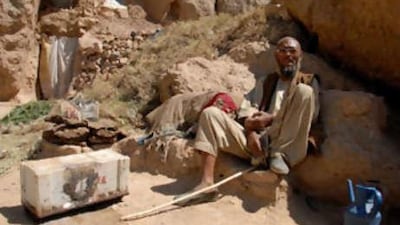BAMIYAN, Afghanistan // Chamand Ali was bent over double as he struggled up the dirt track to his tiny home on the face of the cliff. "You can check - there is nothing to eat," he said after finally arriving. "Every day we just have bread and tea. Once a month we have something to cook in oil as well."
For villagers across the central province of Bamiyan, life is a constant battle for survival. Mr Ali has been unemployed for three months and needs his two sons, aged 10 and 12, to earn the family income. High above them lives Baqir Jafari, who returned to the area after being deported from Iran, where he worked in a shoe factory. He initially looked for a house in the town, but rents were too expensive.
"I don't know what's happening in the rest of Afghanistan," he said. "Poor people do not think about politics and fighting, they just think about how to feed themselves." Surrounded by mountains and with no easy transport to other provinces, Bamiyan finds itself cut adrift. The government, the international community and the media have all, in their own ways, ignored the situation here. This place is famous for two things: its Buddhist heritage and good security. Together they provide an idyllic image that is frequently used to highlight Afghanistan's potential. In fact, they serve only to conceal a troubling reality.
According to residents and the highest-ranking local official, public anger is rising. At the heart of the problem lies an economy that is still in ruins. Frustration with Hamid Karzai, the president, is palpable, and while this has not resulted in widespread violence, there is a sense that some kind of unrest could soon develop. Both Mr Ali and Mr Jafari live illegally on a cliff-face where ancient caves have been crudely fashioned into makeshift houses. During the winter there are regular landslides to go with the near starvation and the threat of eviction.
In the fields below, wheat and potatoes are grown. The farmers can be heard complaining that "nobody cares about the poor people" and fondly remembering a government that has not been in power for 30 years. Some have a second job as labourers in the town. Among them is Faz Lullah, who said money is what counts. If he could earn a decent living and easily feed his family, he would be happy. "It's not getting better, it's getting worse because the prices are high and the situation is very bad," he said.
"Security is good but the problem is with the economy - prices are high and the people cannot find jobs." Like everywhere else in the country, food costs have increased here. A kilogram of flour is up to three times more expensive than it used to be, yet business for farmers is worse. Abdul Samad, an imam, accused Mr Karzai's administration of ignoring Bamiyan's most pressing concerns. "Our economy is dependent on the potato, but our government imports potatoes from Pakistan and other countries," he said. "Why don't they want to buy ours?"
A 2007 report ranked Afghanistan as one of the world's poorest nations, placing it 174th out of 178 on the UN's human development index. It added that 6.6 million Afghans - out of an estimated population of 33 million - do not even receive their minimum food requirements. Bamiyan's residents are among the worst off, with the provincial governor estimating 60 per cent of the population lives below the poverty line.
Habiba Sarabi said no one has died from hunger yet, but warned that some people have come close. She blamed the weakening economy on several factors, including a failure to improve the roads leading in and out of Bamiyan. The return of refugees who fled Afghanistan under the Taliban has also hurt, increasing unemployment and creating a shortage of affordable housing. "We have the best security here in Bamiyan compared to the other parts of Afghanistan, but from an economic point of view Bamiyan is one of the poorest provinces," Mrs Sarabi said. "By the time crops are ready for harvest the market is already full of potatoes from other parts of the country and Pakistan, so farmers can't sell their potatoes at the best price."
It has been almost seven years since the US-led invasion that promised so much, and one of the few remaining peaceful parts of the country is now at a tipping point. The people have not quite given up hope, but patience is running out. Mohammed Hashim has experienced a lot in his life. Having been seriously injured by friendly fire while serving in the army during the Soviet occupation, he is waiting to see what fate will deal him now.
"Bamiyan is the safest province in Afghanistan, but the people keep the security - not the government. If the international community and the Afghan government do not care about this province, then the future will not be good," he said. "In the provinces where there is fighting the government will pay them money, build bridges and lots of schools. Now they have just closed their eyes to us and this was our mistake - we brought security and that's why the government doesn't care about us."
@email:csands@thenational.ae

